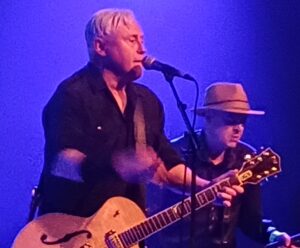Dave Woodhall ventures into long-charted territory for a post-punk panorama.
Digbeth’s changed a bit since the last time bands such as the Skids played there. Back then it was an unlovely slab of back streets and railway arches, the only entertainment either the Irish Centre or the Civic Hall. Then it became the coolest place in the country, as evinced by the lengthy queue outside what’s now the Institute. Not that any of us who remembered it as the Civic would have been headed there. A few yards on and round a corner was The Crossing.
This is a venue I’d never been to before; given its location and lack of corporate branding I thought it would be the sort of sweaty, sticky-carpeted dive I pretend I’ve grown out of. In truth, as everyone who’s been there knows, it’s part of South & City College with a decent capacity, good acoustics, security that’s discreet to the point of invisibility and enough seats for anyone who needs them – something other venues would do well to remember.

Spear of Destiny certainly knew their audience even before taking to the stage, entering to the theme to the Sweeney. Kirk Brandon led his merry men through a selection of their finest back catalogue, making a couple of references to their post-punk status. I was never too sure about the tag – after all, you don’t hear of post-metal or pre-hip hop; what I was hearing was a load of guitar-heavy punky new wave. Perhaps it was the sax, more to the forefront than in the band’s Top of the Pops heyday but anyway, such pigeonholing is one thing that’s thankfully gone out of fashion
The hit that was, Never Take Me Alive, drew a big response, rivalled by the hit that should have been, World Service. In between these two Soldier Solder was as poignant as ever while Liberator closed a set that was more than warmly appreciated by a more or less capacity audience. Spear of Destiny had not just been a support act and there’s many a headliner who would have been worried about following them.
Luckily, though, the Skids have got a couple of advantages over ‘many’ headliners. The first is some of the most criminally overlooked and catchy tunes of their era. The second is an equally overlooked frontman.
Richard Jobson would be the first to admit that he doesn’t possess one of rock’s great voices. What he does have is charisma by the bucketful, a marvellous line in self-deprecation and at 64 the sort of limitless stamina that enables him to keep going at a rate that would trouble singers a third his age.
As with SoD, the setlist came as no surprise to virtually everyone in the room. Billed as a 45th anniversary of the album Days in Europa, there was plenty from that source as well as other fan favourites. Working for the Yankee Dollar naturally had a few updated jibes about the President-elect, The Saints Are coming was introduced with a tongue in cheek rant about the “bastards” who think it’s a Green Day Cover.

As with every gig the band plays the shadow of the late, undeniably great, Stuart Adamson looms over the evening. Jobson talks affectionately about his former songwriting partner, at one point saying about how he didn’t do anything after leaving the band, while describing how every time Jobson’s driving through the Scottish Highlands “that tune” goes through his head – then humming a few bars of In A Big Country; “It’s worse than toothache”.
Naturally the biggest cheer is reserved for Into The Valley, mainstay of many a new wave compilation and playlist over the past four decades. The most scathing note is for TV Stars, and rare it is that a singer describes one of his own compositions as “one of the worst songs ever written.” If ever there was a love-hate relationship between a singer and his song it’s this ode to seventies soap characters.
Fittingly the set ends with Circus Games, the last song written by the Adamson/Johnson partnership then the encore begins with Charles, the only one out of the first 25 songs recorded in a hour when the band started out that wasn’t shit – his words, not mine. This is followed by a lengthy acapalla introduction to A Woman In Winter, an equally fitting end to a night of quality music and fine musicianship. The venue’s not bad, either.


